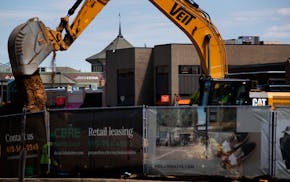It could cost $100 million or more upfront, and another $4 million a year, to pipe water from the Mississippi River to refill the notoriously depleted White Bear Lake, a state study reported on Friday.
Homeowners on the lake immediately denounced the estimate, offered by the Minnesota Department of Natural Resources.
"That's ridiculously high," said Greg McNeely, who chairs the White Bear Lake Restoration Association. "If it costs that much — and it doesn't have to — it'll never get done."
It's unclear who would be expected to pay to restore the lake, in part because scientific studies are still underway aimed at figuring out why the water level has dropped.
Jason Moeckel, of the Minnesota Department of Natural Resources, said the projected costs are higher than homeowners believe because "there really is a difference between a professional engineer costing it out, vs. a contractor's back-of-the-envelope estimate."
The DNR stressed that it's merely providing estimates of the likely range in costs, depending on factors such as the need to clean the river water before it's delivered.
The base estimate for the two alternatives under study was $55 million to $67 million, with another $600,000 in annual costs. The difference in price depends on which lake in nearby Vadnais Heights the water is drawn from: Sucker Lake or East Vadnais Lake, both about 4 miles west of White Bear Lake, but both of which draw plentiful surface water from the mighty Mississippi.
Consulting engineers were quick to add, however, that it might be necessary for construction costs to range from $78 million to $107 million if it turns out that pumping the river water, absent proper treatment, would pour harmful phosphorus into White Bear Lake. That could raise annual costs to as much as $4 million.
Mark Burch, the city engineer in White Bear Lake, said he trusts that the consultants from the firm of Short Elliott Hendrickson got it right, at least in rough terms.
"It's a good firm, and their work was peer-reviewed by two other firms, so I have to think they know what they are doing," he said. "The Metropolitan Council was at the meeting [with various stakeholders on Friday morning] and agreed that this is what their projects cost per mile. It doesn't seem out of line to them. And that's what they do — big pipe projects with pumps, that's their business." The Met Council operates the area's sewers.
But McNeely, who was at the meeting as well, said that homeowners are pulling together their own study. "We will have that hopefully by March, and I told the state people to be prepared for another option, which will be a lot lower."
The 2015 Minnesota Legislature directed the DNR to devise cost estimates for augmenting White Bear Lake after years of complaints that low lake levels were ruining its recreational value.
The question of what the pumping could do to water levels in Vadnais Heights and other systems nearby was beyond the scope of the study, Moeckel said, but would have to be investigated before any concrete steps were taken.
In the meantime, all sides await the September delivery of a report from the U.S. Geological Survey, which is conducting a three-year study of how surface water and groundwater interact in the northeast metro.
White Bear Lake Mayor Jo Emerson said she isn't certain how the city would feel about helping pay the cost of piping in water.
"We haven't gone into that in any depth at all," she said.
David Peterson • 651-925-5039

Shop the curbs for free on 'Trash to Treasure Day' in White Bear Lake

Lacrosse lists: 21 top players and the school that's No. 1 for boys and girls

Will 'shotgun only' zone for deer in southern Minnesota be abolished?
One killed in head-on crash in Coon Rapids

